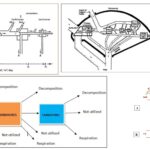IB Biology 31 Views 1 Answers
Sourav PanLv 9November 9, 2024
What are the causes and treatments of emphysema, and how does this disease affect gas exchange in the lungs?
What are the causes and treatments of emphysema, and how does this disease affect gas exchange in the lungs?
Please login to save the post
Please login to submit an answer.
Sourav PanLv 9May 15, 2025
Emphysema is a chronic lung condition that primarily affects the alveoli, the tiny air sacs in the lungs responsible for gas exchange. Understanding the causes, treatments, and effects of emphysema on gas exchange is crucial for managing this disease effectively.
Causes of Emphysema
- Smoking:
- The leading cause of emphysema is long-term smoking. Cigarette smoke contains harmful chemicals that damage lung tissue and promote inflammation, leading to the destruction of alveolar walls and loss of elasticity in the lungs .
- Environmental Factors:
- Exposure to air pollutants, such as industrial fumes, chemical vapors, and dust, can also contribute to the development of emphysema. Individuals in occupations with high exposure to these irritants are at increased risk .
- Alpha-1 Antitrypsin Deficiency:
- A genetic condition that results in a deficiency of alpha-1 antitrypsin (AAT), a protein that protects lung tissue from damage by enzymes released during inflammation. This deficiency can lead to early-onset emphysema, particularly in non-smokers .
- Age and Gender:
- Emphysema typically develops over many years, with symptoms often appearing in middle age or later. It is more common in men, although the prevalence in women has been increasing due to rising smoking rates among females .
Effects of Emphysema on Gas Exchange
- Destruction of Alveoli:
- Emphysema leads to the destruction of alveolar walls, resulting in larger but fewer air sacs. This reduces the surface area available for gas exchange, impairing the lungs’ ability to oxygenate blood and remove carbon dioxide (CO2) effectively .
- Air Trapping:
- The loss of elastic recoil in the lungs causes air trapping during expiration. As a result, stale air remains in the lungs, leading to hyperinflation and reduced fresh air intake during subsequent breaths. This further diminishes oxygen availability for gas exchange .
- Hypoxia and Hypercapnia:
- The impaired gas exchange results in lower oxygen levels (hypoxia) and higher carbon dioxide levels (hypercapnia) in the blood. These conditions can lead to respiratory failure if not managed properly .
Treatments for Emphysema
While there is no cure for emphysema, various treatments aim to alleviate symptoms, improve quality of life, and slow disease progression:
- Medications:
- Bronchodilators: These medications relax airway muscles, making breathing easier. They can be short-acting for immediate relief or long-acting for regular use.
- Inhaled Corticosteroids: These reduce airway inflammation and help prevent exacerbations.
- Antibiotics: Used to treat bacterial infections that may occur due to compromised lung function.
- Oxygen Therapy:
- For patients with severe emphysema and low blood oxygen levels, supplemental oxygen can help improve oxygen saturation and relieve symptoms.
- Pulmonary Rehabilitation:
- A structured program that includes exercise training, nutritional advice, and education about managing lung disease can enhance physical fitness and overall well-being.
- Surgical Options:
- Lung Volume Reduction Surgery (LVRS): Involves removing damaged lung tissue to improve airflow and breathing efficiency.
- Lung Transplantation: Considered for patients with very severe emphysema who do not respond to other treatments.
- Lifestyle Changes:
- Quitting smoking is the most effective way to slow disease progression. Avoiding environmental pollutants and engaging in gentle exercise can also help manage symptoms .
0
0 likes
- Share on Facebook
- Share on Twitter
- Share on LinkedIn
0 found this helpful out of 0 votes
Helpful: 0%
Helpful: 0%
Was this page helpful?




